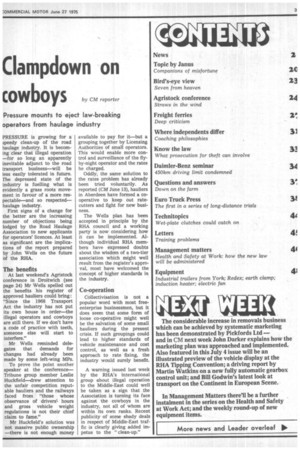Clampdown on
Page 5

If you've noticed an error in this article please click here to report it so we can fix it.
cowboys by CM reporter Pressure mounts to eject law-breaking
operators from haulage industry
PRESSURE is growing for a 3peedy clean-up of the road haulage industry. It is becoming clear that illegal operation —for so long an apparently inevitable adjunct to the road transport business—will be less easily tolerated in future. The depressed state of the industry is fuelling what is evidently a grass roots movement in favour of a more respectable—and so respected— haulage industry.
First signs of a change for the better are the increasing number of objections being lodged by the Road Haulage Association to new applicants for operators' licences. At least as significant are the implications of the report prepared by John Wells on the future of the RHA.
The benefits
At last weekend's Agristock conference in Droitwich (see page 24) Mr Wells spelled out the benefits his register of approved hauliers could bring: "Since the 1968 Transport Act the industry has not put its own house in order—the illegal operators and cowboys are still there. If we don't have a code of practice with teeth, someone else will start to interfere."
Mr Wells reminded delegates that demands for changes had already been made by some left-wing MPs. To prove the point another speaker at the conference— Tribune group member Leslie Huckfield—drew attention to the unfair competition reputable hauliers and the railways faced from "those whose observance of drivers', hours and gross vehicle weight regulations is not their chief claim to fame."
Mr Huckfield's solution was not massive public ownership —there is not enough money available to pay for it—but a grouping together by Licensing Authorities of small operators. This would enable more control and surveillance of the flyby-night operator and the rates he charged, Oddly, the same solution to the rates problem has already been tried voluntarily. As reported (CM June 13), hauliers in Aberdeen have formed a cooperative to keep out ratecutters and fight for new business.
The Wells plan has been accepted in principle by the RHA council and a working party is now considering how it can be implemented. Although individual RHA members have expressed doubts about the wisdom of a two-tier association which might well result from the register's approval, most have welcomed the concept of higher standards in the industry.
Co-operation
Collectivisation is not a popular word with most freeenterprise businessmen, but it does seem that some form of loose co-operative might well be the salvation of some small hauliers during the present crisis. If such groupings could lead to higher standards of vehicle maintenance and cost control, as well as a fresh approach to rate fixing, the industry would surely benefit.
A warning issued last week by the RHA's international group about illegal operation to the Middle-East could well be taken as a sign that the Association is turning its face against the cowboys in the industry, not all of whom are within its own ranks. Recent publicity of some shady deals in respect of Middle-East traffic is clearly giving added impetus to the "clean-up."




















































































